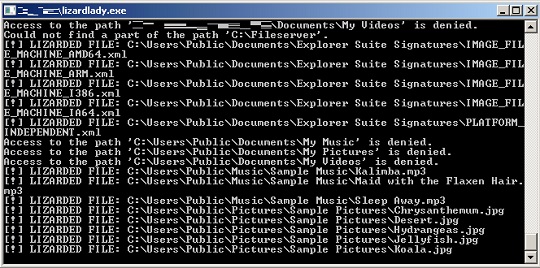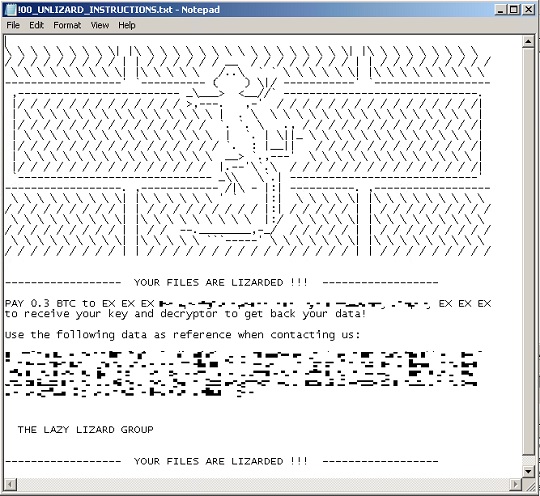Ransom.MSIL.LAZYLIZARD.THJODBC
Trojan-Ransom.FileCrypter (IKARUS)
Windows


Threat Type: Ransomware
Destructiveness: No
Encrypted:
In the wild: Yes
OVERVIEW
This Ransomware arrives on a system as a file dropped by other malware or as a file downloaded unknowingly by users when visiting malicious sites.
It encrypts files with specific file extensions. It encrypts files found in specific folders. It drops files as ransom note.
TECHNICAL DETAILS
Arrival Details
This Ransomware arrives on a system as a file dropped by other malware or as a file downloaded unknowingly by users when visiting malicious sites.
Other Details
This Ransomware does the following:
- It deletes files that has the .lizarded before encryption.
- It displays a console that logs all of the files that it encrypted successfully.

It accepts the following parameters:
- -p/--path {path} → encrypts specified path
Ransomware Routine
This Ransomware encrypts files with the following extensions:
- exe
- dll
- so
- rpm
- deb
- vmlinuz
- img
- lnk
- jpg
- jpeg
- bmp
- gif
- png
- svg
- psd
- raw
- mp3
- mp4
- m4a
- aac
- ogg
- flac
- wav
- wma
- aiff
- ape
- avi
- flv
- m4v
- mkv
- mov
- mpg
- mpeg
- wmv
- swf
- 3gp
- doc
- docx
- xls
- xlsx
- ppt
- pptx
- odt
- odp
- ods
- txt
- rtf
- tex
- epub
- md
- yml
- yaml
- json
- xml
- csv
- db
- sql
- dbf
- mdb
- iso
- html
- htm
- xhtml
- php
- asp
- aspx
- js
- jsp
- css
- c
- cpp
- cxx
- h
- hpp
- hxx
- cs
- java
- class
- jar
- war
- ps1
- bat
- vb
- awk
- sh
- cgi
- pl
- ada
- swift
- go
- py
- pyc
- bf
- coffee
- zip
- tar
- tgz
- bz2
- 7z
- rar
- bak
It encrypts files found in the following folders:
- %Desktop%
- %User Profile%\Documents
- %Public%
- C:\Fileserver
(Note: %Desktop% is the current user's desktop, which is usually C:\Documents and Settings\{User Name}\Desktop on Windows 2000(32-bit), XP, and Server 2003(32-bit), or C:\Users\{user name}\Desktop on Windows Vista, 7, 8, 8.1, 2008(64-bit), 2012(64-bit) and 10(64-bit).. %User Profile% is the current user's profile folder, which is usually C:\Documents and Settings\{user name} on Windows 2000(32-bit), XP, and Server 2003(32-bit), or C:\Users\{user name} on Windows Vista, 7, 8, 8.1, 2008(64-bit), 2012(64-bit) and 10(64-bit).. %Public% is the folder that serves as a repository of files or folders common to all users, which is usually C:\Users\Public in Windows Vista, 7, and 8.)
It appends the following extension to the file name of the encrypted files:
- {original filename}.{original extension}.lizarded
It drops the following file(s) as ransom note:
- {encrypted directory}\!00_UNLIZARD_INSTRUCTIONS.txt

SOLUTION
Step 1
Trend Micro Predictive Machine Learning detects and blocks malware at the first sign of its existence, before it executes on your system. When enabled, your Trend Micro product detects this malware under the following machine learning name:
- Troj.Win32.TRX.XXPE50FFF074
Step 2
Before doing any scans, Windows 7, Windows 8, Windows 8.1, and Windows 10 users must disable System Restore to allow full scanning of their computers.
Step 3
Scan your computer with your Trend Micro product to delete files detected as Ransom.MSIL.LAZYLIZARD.THJODBC. If the detected files have already been cleaned, deleted, or quarantined by your Trend Micro product, no further step is required. You may opt to simply delete the quarantined files. Please check the following Trend Micro Support pages for more information:
Step 4
Restore encrypted files from backup.
Did this description help? Tell us how we did.


